Ghetts: “What I wanna say to people is: Find your purpose”
Find your purpose: UK rap legend Ghetts on new album 'On Purpose, with Purpose'
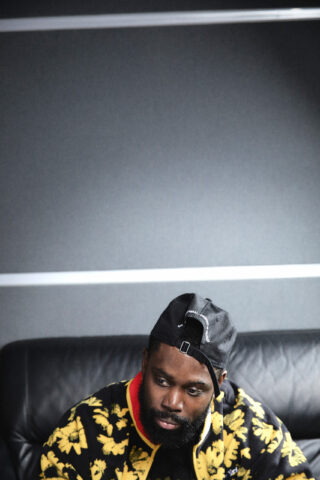
Find your purpose: UK rap legend Ghetts on new album 'On Purpose, with Purpose'
Towards the end of our conversation, Ghetts leans towards me with an abrupt intensity. “Make sure you put in the stuff we spoke about at the end of the interview, yeah?” he says, “That stuff is more important than anything I’ve said about the album; that’s the message I want to get across.” We’ve taken a turn, at some point, towards the bigger philosophical picture, to the broader themes of life, death, love, parenthood and how to navigate them. The vital task, Ghetts emphasises, at a time when everything seems doomed, is nurturing our children’s natural ability to love, because they, after all, are the ones who might be able to sort out all the messes we keep creating. This, Ghetts stresses – love and focus and commitment to family – is what he is about: beyond the PR chat we’re having, beyond his new album, there’s an essential set of truths he feels a responsibility to communicate. “What I wanna say to people is: Find your purpose,” he nods, gesturing around his studio as if to indicate both that he has found his, and also that all this, the material stuff, is not it. “’Cos we’ll all just live and die chasing money without finding the purpose. And money makes people feel nice. But it makes people feel like they’re better than other people. And the truth is, as human beings, we all wake up tomorrow. And if we had to live as we’re meant to, and we was all equal, I’d be fine. I wouldn’t need any money to feel better than somebody else. Money enables me to live and have certain freedom that I crave… but in the midst of that, don’t forget what your actual purpose is. Like, what makes you feel like your soul is on fire? Because a lot of people, unfortunately, they never get to feel that.”
This introspective energy shot through with the wisdom of a newfound maturity is not as removed from the album as Ghetts implies. On Purpose, with Purpose announces its focus in the title and follows through on most of the tracks, reflecting an assured maturity that is a stylistic shift from previous work. As his publicist remarks, if Conflict of Interest (Ghetts’ hit 2021 record) might be classified as ‘revolution’, On Purpose, with Purpose is ‘evolution’. The fuel for this evolution is not only Ghetts’ inevitable growth with age (as one of the few rappers of his generation able to sustain a career across decades), but a renewed commitment to God, a strict routine that includes rigorous daily gym sessions, and a reckoning with grief.
Following the release of Conflict of Interest, Ghett’s beloved nan died. It was the first close family loss, and he was feeling it all through the process of developing On Purpose – uncharacteristically unable to work through the feelings in lyrics, as he normally might. “One of the most important people to me – and I couldn’t even really, I’ve never before got a place where I can’t articulate what I need to articulate. But I couldn’t really articulate that whole [experience in a] song,” he says. Instead, the enormity of the loss occurs across the album as a series of motifs and images, bleeding through the music in unexpected ways.
There is the recurring mountain imagery, which suggests the scaling of difficult emotions, but is also a more complex metaphor that’s bound up with a wider cultural and spiritual sensibility. The kung fu films he watched as a younger man, Ghetts explains, often included characters who would experience a hardship, and find themselves, beaten and blooded, on a journey to a mountain, where they would level up. “And so, from the start of when I’ve been emceeing, I used to talk about ‘going to the mountain’. A bunch of emcees have quoted me on that, from Stormz – loads of different people have spoken about the mountain.” In fact, he has even named the studio complex where our interview takes place, ‘Mount Excellence’, a homage to those kung fu movies, and a reflection of the fact the studio’s existence marks his own levelling up.
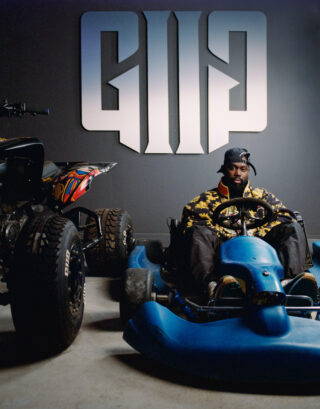
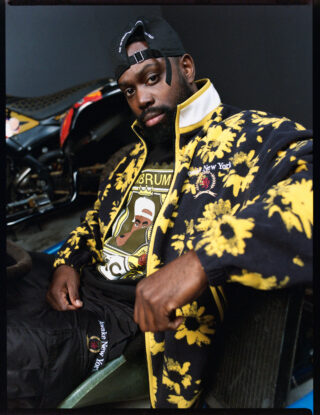
Early in On Purpose, with Purpose is a sample of Martin Luther King’s I Have A Dream speech, where the imagery of the mountain suggests the possibilities and challenges of the civil rights movement. For Ghetts, however, it was the spiritual element of Dr King’s words, rather than the political message, that resonated. “When he was talking about he’s been to the mountain and God allowed him to – I just connected with him on a different level. And when he was saying about being ready to do God’s work, spiritually, that’s where I was at. And I felt it was pretty cool that it tied in. I think they call the word serendipity. Everything just comes together.”
Elsewhere on the record, Ghetts grapples with the challenges that friendships undergo when you reach your 30s, and channels ‘Brenda’s Got a Baby’ on ‘Jonah’s Safety’ – both a homage to Tupac’s classic, and a response to his partner’s job as a social worker, which serves as a reminder of the daily struggles faced by many of those we exist alongside. If there’s a tonal misstep it is, for me, Twin Sisters, which involves some fairly standard unreconstructed grime misogyny (“I been fucking twin sisters they don’t make the same sound… you ain’t gotta move my head bitch, I know my way down”). I choose to go with a generous reading, and tell him it reminds me of how, even with therapy and the conviction you’re past the idiocy of youth, it’s easy to find yourself back in the old patterns, doing stupid things even though you know better. “Yeah, facts,” Ghetts laughs. “I like that explanation a lot, I’m gonna use that in my next interview.”
The playing with nuance is also a theme, of course. This is evident in the early album promotion, in which culture wars slogans (‘Real G’s don’t participate in gender wars’, ‘We are in a time where people believe anything but the truth’) are writ large on posts hashtagged GIIG – and seem weirdly reductive once you know what’s on the record. But then, Ghetts explains, parodying the contemporary tendency towards reduction is important, because it’s a way to signal how complicated, nuanced issues can be made corrosive when simplified to appeal to our base emotions. “I could see everything that’s going on. I could see most podcasts. The usual subject, gender wars, male versus female. ‘Who’s paying the bill?’ Dumb shit like that. And I was just thinking, this is so not layered. Is this where everyone’s brains is? So I took what everyone’s thinking, and what I did was take some of the lines from the album and use them as placards. So I just thought, yeah, real men don’t take part in gender wars, that’s it.”
There’s a bigger stake at play behind the culture wars debates, Ghetts reminds me, and that is the way that extreme disagreement is used as a tactic of distraction, dividing us from one another and serving no purpose in terms of bettering anyone’s life in spiritual or material terms. “Cancel culture is like… I can put something out about you today and people jump on that bandwagon with no research at all. But your livelihood could be at stake from this information that Ghetts decided just to put out there right now. And that’s a dangerous thing. That is super, super dangerous. Now, are there some people that deserve to be cancelled? Of course there is. But it’s like everything, we can’t, just because somebody said this and everyone is controlled just by a flurry of emotions. Which brings me to, what I say is, ‘divided by race, divided by religion, divided we fall.’ Because the truth is this, we\re all poor. Do you know what I’m saying? So we spent all day arguing with each other while laws have passed. Yeah, laws are being passed while we’re arguing with each other – laws that don’t benefit none of us where we are. White, Black, Asian, what? It doesn’=’t benefit none of us. But we’re busy arguing about all of these different things.”
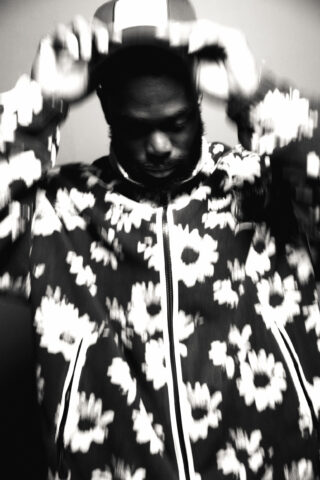
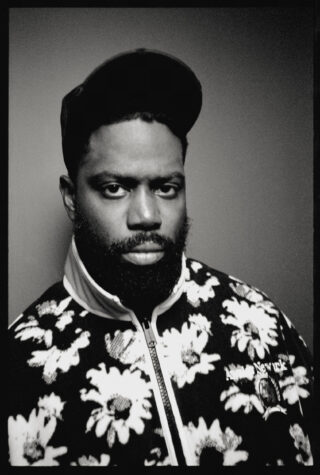
The evolution showcased in the album transcends the content too. There is also an evolution in the sound and the skill of the lyrical composition, indicating how Ghetts is still pushing himself, despite his status as one of the OGs of the UK grime/hip hop scene. He cites Jay Z’s Fade to Black film as a huge influence, shaping his technique and approach to the writing process – he works entirely with a freestyle method, working out tracks over the mic, rather than writing lyrics down. “Fade to Black was the sickest thing I’ve ever seen a rapper do. And if I could accomplish half of what I’ve just watched… because I thought it was alien. Well it is alien, and just because I’ve learned to do it doesn’t mean it’s not. It takes a form of brain training. Working your memory to be able to hold so many words that are just now available. But watching Fade to Black every day. Every single day watching and thinking, seeing Jay Z’s session with [Rick] Ruben, when he was making ‘99 Problems’ and thinking, ‘fuck!’. I just couldn’t fathom it. And then I started trying, and it was like, one to four bars. If you can do four, you can get eight, sixteen, and so on.”
More recently, Ghetts tells me, he has turned away from hip hop and grime influences, and started studying other forms of music, in an attempt to keep improving. “I’m obsessed with being the best. I’m still obsessed with, like, being great at the art. At going on stage and people looking and thinking, wow, that was an amazing show. Not just because I’ve got great songs, but the show I actually put on, you can see that this is somebody that respects the art, that studies the craft. So I’ve been listening to a lot of people not from the genre, because I’ve grown up on those that are greats from the genre. Now, listening to people that I might have ignored when I was a bit younger, you know, I’m saying, wow, that song was just well written. Why did it connect like that? Super well written. Just trying to add that to my arsenal.”
Do you worry, I ask him, that this maturity might change your sound so much its turns your fan base away? “Nah,” he says. “I feel like someone who they may consider the elder statesman has to lead by example. You’re not gonna get the 19-year-old version of Ghetts, or the 21-year-old version of Ghetts. That’s impossible for me to do. And I always say to people, isn’t what you loved about me that I was raw and authentic, unapologetically myself? And that’s what I still am. Because I’m talking about things that you might not have heard before. I’m talking from where my mindset is. And I hope to always reflect authenticity. That’s what I hope for, because that’s what really the genre is, you know – people that was coming up raw, authentic, and saying things that was relatable to the lives of those who are listening. And now, here we are. And if you don’t find [On Purpose, with Purpose] believable right now… it’s gonna be believable, that’s the bottom line. In years, or months, or whatever, you’re gonna come back, listen, and it’s gonna hit you like a tonne of bricks.”